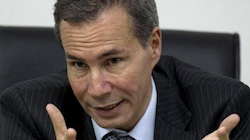The death of prosecutor Alberto Nisman — who accused President Cristina Kirchner of covering up a probe into a 1994 bombing — is the latest in a series of politically sensitive cases that have involved mysterious deaths, amid widespread irregularities in Argentina’s justice system.
Nisman was found in his apartment on January 18, alongside a gun and a bullet casing. The previous week, he said that President Cristina Fernandez and Foreign Minister Hector Timerman formed part of “an aggravated cover-up” in the investigation over Iran’s role in the 1994 bombing of a Jewish community center, which killed 85 people.
Nisman was due to testify before Congress on the findings of his investigation on January 19, and was under police protection because of threats. Various journalists across the region tweeted about interviews they had set up with Nisman before his body was found, and expressed doubts over whether the death was a suicide.
Argentine prosecutor Nisman told me in e-mail Saturday that he was “obviously” interested in doing an interview this week. Seemed confident.
— Andres Oppenheimer (@oppenheimera) January 19, 2015
Prosecutor Nisman found dead after charging CFK with cover-up Iran’s alleged 1994 AMIA bombing. He had promised me interview for tomorrow.
— Uki Goñi (@ukigoni) January 19, 2015
#MuerteDeNisman Conocí al Fiscal, era honesto y estaba amenazado de muerte. El suicidio es una conducta que no coincide con su personalidad.
— Roman Lejtman (@romanlejtman16) January 19, 2015
InSight Crime Analysis
This is not the first time that a high-profile case in Argentina with major political implications has involved a sudden, mysterious death. Other examples include:
- In 1998, a retired navy captain who was a key witness in an arms trafficking case involving illegal sales to Ecuador and Croatia was found dead from a bullet to the head.
- In 2003, another key witness involved in that same case was found dead, having apparently jumped out of her 10-story apartment building while wearing a nightgown and clutching a knife.
- In 1998, a businessman involved in a massive bribery case, concerning kickbacks paid by IBM Argentina, was found hung in a construction site. The courts ruled it a suicide, over his family’s insistence that it was a murder.
Nisman, however, was not a witness but a state prosecutor who had said that the highest levels of Argentine political leadership were obstructing justice. Argentina expert and political analyst Eamonn MacDonagh said his death was “hugely important.”
“The conclusion will be that it was a suicide, there was no third party involved, and absolutely no one will believe it,” he predicted.
MacDonagh added that “it’s fair to say” that the unsatisfactory resolution to many political cases involving mysterious deaths “has something to do with Peronist culture,” referring to the Argentina political movement headed by Kirchner and her deceased husband Nestor, among others. “It doesn’t involve killing many people but it’s not averse to killing people if absolutely necessary,” he said.
President Kirchner has faced other scandals — some of them involving drug trafficking — that have called into question the strength of Argentina’s rule of law. A report released last year by think-tank the International Assessment and Strategy Center detailed other ongoing investigations in which Kirchner has been accused of failing to cooperate.

